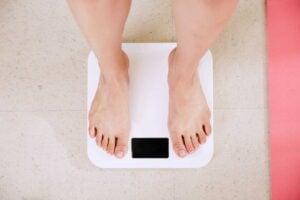Progesterone & Sleep: The Secret to Feeling Like Yourself Again in Perimenopause and Menopause
Let’s be real—when was the last time you woke up feeling truly rested?
If you’re like many of the women I see in practice, you’ve tried everything: magnesium, melatonin, weighted blankets, herbal teas, meditation apps, lavender on your pillow—you name it. And yet, the clock still flashes 3:07 a.m., and there you are: wide awake, maybe sweating, mind racing, wishing your brain had an off switch.
Here’s the thing I wish more women knew: for many of us in our 40s and 50s, the root of sleep issues isn’t stress, or aging, or not trying hard enough—it’s hormonal. And specifically? It’s often a drop in progesterone.
I have had countless heart-to-heart conversations with patients in perimenopause and menopause who feel like they’re unraveling—and sleep (or lack of it) is usually the starting point.
The good news is: there is a way to support your body, and one of the most effective tools in our toolbox is bioidentical progesterone replacement.
Let’s break down why progesterone is such a game-changer for sleep—and how better sleep can make everything feel better.
Why Progesterone Matters for Sleep (And Sanity)
Progesterone is often labeled the “feel-good” hormone, and for good reason. It has a calming effect on the brain, thanks to its interaction with GABA receptors—the same calming pathways targeted by medications like Valium or Xanax, only this is your body’s own chill pill.
When progesterone is at appropriate levels, it helps you:
- Fall asleep more easily
- Stay asleep throughout the night
- Wake up feeling rested
- Handle stress with more resilience
- Feel less anxious or emotionally reactive
The problem? As we enter perimenopause, which can start as early as our late 30s or early 40s, progesterone begins to decline—often long before estrogen starts to drop. And that hormonal imbalance can wreak havoc on your sleep, mood, and sense of self.
I can’t count how many times a woman has sat across from me in the exam room, saying things like:
- “I’m so tired and crabby—I feel like I’m snapping at everyone, even when I don’t mean to.”
- “I can’t motivate myself to go to the gym because I’m always tired”
- “I used to love my mornings. Now I drag myself out of bed like a zombie.”
When we test their hormones and find low progesterone, it’s like the light bulb finally goes off: “Oh, this isn’t just in my head.”
Once we start bioidentical progesterone replacement, often in the form of an oral capsule taken at night, many of these women report sleeping better. And as sleep improves, so does their patience, their energy, their relationships, and their confidence.
What the Research Shows
Progesterone’s sleep-supporting powers aren’t just anecdotal—they’re backed by science.
A study published in Psychoneuroendocrinology found that oral progesterone significantly increased total sleep time and improved sleep architecture by enhancing Stage 2 non-REM sleep. It also reduced wake time after falling asleep—something women in perimenopause often struggle with.
“Oral progesterone produced a significant increase in sleep time and reduced wake time after sleep onset,” the study notes, highlighting progesterone’s calming, sedative-like effects on the brain.
(Schüssler et al., 2008. Psychoneuroendocrinology, 33(5), 675–680)
While this particular study used male participants for sleep EEG data, the mechanism—how progesterone enhances GABAergic tone in the brain—is well established across both genders. And for women dealing with hormonal transitions, it’s even more relevant.
Sleep Better, Live Better
Here’s the thing: when sleep is restored, everything starts to shift.
Mood improves
When you’re rested, you’re more patient, more present, and less reactive. Hormonal mood swings soften. You stop feeling like you’re going to snap over the little things your partner or others are doing.
Energy comes back
You wake up with the motivation to move your body, be productive, or just enjoy your life without dragging.
Brain fog lifts
You can finally remember what you walked into a room for. (Seriously.)
Anxiety decreases
Progesterone’s calming effects are especially helpful for women dealing with perimenopausal anxiety and a constant “wired but tired” feeling.
Hormones rebalance
Progesterone helps counterbalance the effects of estrogen dominance—supporting more stable cycles, lighter periods, and less PMS.
Weight, immunity, and longevity benefit
When you’re sleeping deeply, your body can regulate cortisol, improve insulin sensitivity, support immune function, and even protect your brain and heart long-term.
What I Want Every Woman to Know
I wish more women knew that poor sleep in midlife isn’t something you just have to accept. You’re not “crazy,” and you don’t need to white-knuckle your way through this phase of life. There are tools—gentle, effective, and backed by science—that can help.
In my clinical experience, bioidentical progesterone is one of the most effective ways to restore sleep and balance during perimenopause and menopause.
And honestly? It’s one of the most satisfying therapies to prescribe—because when women sleep again, their whole world changes.
Is Progesterone Therapy Right for You?
If you’re struggling with:
- Light or disrupted sleep
- Nighttime anxiety or restlessness
- Fatigue, mood swings, or mental fog
- That “off” feeling you just can’t shake…
…it’s time to look at your hormones.
At Joy Wellness Partners, we use comprehensive hormone testing and personalized protocols to help you find balance, naturally. We don’t just treat symptoms—we find the root cause and support your body’s innate ability to heal.
With Joy,
Gavneet Uppal, NP, MSN, FNP-C







